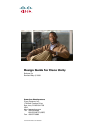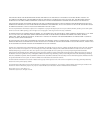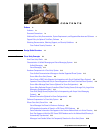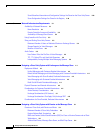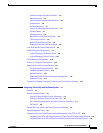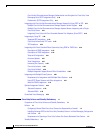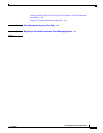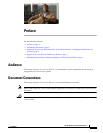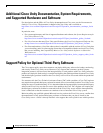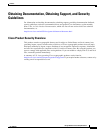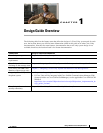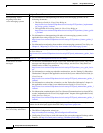
Contents
iv
Design Guide for Cisco Unity Release 5.x
OL-14619-01
Some Subscriber Information and Configuration Settings Are Stored on the Cisco Unity Server 2-10
Some Configuration Settings Are Stored in the Registry 2-10
CHAPTER
3 Network Infrastructure Requirements 3-1
Availability of Network Resources 3-1
Name Resolution 3-1
Domain Controller Access and Availability 3-2
Availability of Message Store Servers 3-2
Using Firewalls with Cisco Unity 3-3
Sizing and Scaling Cisco Unity Servers 3-3
Maximum Number of Users on Dedicated Domino or Exchange Servers 3-4
Storage Capacity for Voice Messages 3-4
Number of Voice Ports 3-4
Audio Codecs 3-5
How Codecs Affect the File Size of Voice Messages 3-5
TTS, TTY, Pocket PCs, and Hand-Held Computers 3-6
Interoperability Among Multiple Voice-Messaging Systems 3-6
CHAPTER
4 Designing a Cisco Unity System with Exchange as the Message Store 4-1
Deployment Models 4-1
Unified Messaging with Customer-Provided Infrastructure 4-2
Mixed Unified Messaging and Voice Messaging with Customer-Provided Infrastructure 4-2
Voice Messaging with Cisco-Provided, Dedicated Infrastructure 4-2
Voice Messaging with Customer-Provided Infrastructure 4-3
Multi-Site WAN with Distributed Messaging 4-3
Physical Placement and Network Infrastructure 4-4
Considerations for Customer-Provided Infrastructure 4-5
Active Directory Considerations 4-5
Exchange Considerations (All Versions) 4-7
Exchange Considerations That Apply Only Exchange 2007 4-8
Considerations for Cisco-Provided, Dedicated Infrastructure 4-9
CHAPTER
5 Designing a Cisco Unity System with Domino as the Message Store 5-1
Overview of Cisco Unity with Domino and Notes 5-1
Maximum Number of Cisco Unity Subscribers 5-2
Domino Address Book Terminology 5-2
IBM Lotus Domino Unified Communications (DUC) for Cisco on Domino Servers and on Client
Workstations
5-2
Address Book Server, Message Store Server, and Mail Drop Server 5-4



